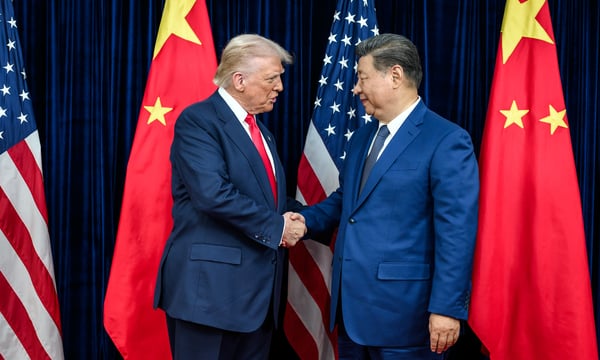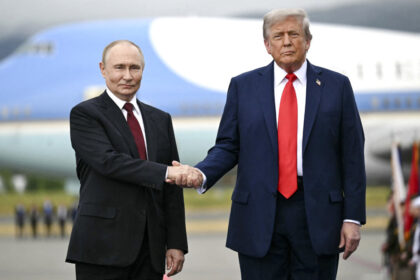U.S. President Trump wrote a one-line post on social media – “THE G2 WILL BE CONVENING SHORTLY!” – moments before heading into his summit with Chinese leader Xi Jinping on October 30 in South Korea. Many in the West, including in the United States, thought this reference to China and the U.S. together setting the agenda for global governance would delight reputation-conscious Beijing.
It is indeed true that the term “G-2” carries “heavy historical baggage” for China-U.S. relations. “Trump’s use of the once-discarded term has come at a time when observers and analysts, including those advising Beijing, are deciphering his administration’s China policy, which has yet to crystallize in the face of a more assertive Chinese government,” wrote the Associated Press world politics columnist Didi Tang. Writing for The Diplomat, City University in Hong Kong professor Michael (Jinghan) Zeng observed that “a seemingly offhand remark from Trump signals the return of an idea once proposed and dismissed by both Washington and Beijing.”
But within China, scholars and experts largely didn’t celebrate the implied power equilibrium between the United States and China in Trump’s invocation of the G-2 idea. Instead, the op-ed columns and media commentaries appeared to be more preoccupied with asking why Trump is trying to resurrect a long-dead concept. A prominent Sino-U.S. relations scholar offered an overview of “20 years of iteration and evolution” of the G-2. Other headlines on the topic included “Trump has resurrected the G-2, will China agree?” or the more provocative, “Trump raised the white flag… why did the U.S. give in?” with reference to his “G-2” mention.
The overwhelming opinion has been that China should not buy into the so-called G-2 concept. The reason for dismissing the offer is simple – echoing what then-Chinese Premier Wen Jiabao had said while rejecting the idea in 2009, the mainstream Chinese view is that Trump is not offering equal cooperation, but merely creating a new trap for China.
The ideologically left-leaning intelligentsia in China has advocated a stronger opposition to the concept.
“The U.S. hegemony has pushed China-U.S. relations into ‘strategic competition.’ The high-profile and globally watched Sino-U.S. summits and subsequent efforts to implement a highly consensus-based strategy have failed to restore Sino-U.S. relations to their pre-strategic competition state,” Zhang Zhikun, an influential leftist scholar, wrote on Chinese social media. Both former U.S. Joe President Biden and current President Trump have repeatedly stated that the U.S. will continue its strategic competition with China, Zhang added.
Therefore, the notion of China-U.S. relations “returning to the right track” has become an unattainable dream. Zhang also asked why the U.S. resurrected the G-2 concept at a time when no one in China still believes that the Sino-U.S. relationship is “the world’s most important bilateral relationship,” as it is commonly framed in the United States.
If Trump thought he did Xi a favor by granting China equal status by calling their meeting in Busan a “G-2 meeting,” that assumption was incorrect. Instead, Trump became a subject of ridicule among scholars in China for displaying a complete lack of understanding of the history of China-U.S. relations, much less the idea of the G-2 itself.
Just like Beijing was wary toward then-President Barack Obama’s call for increased involvement by China in global governance in the late 2000s, China remains suspicious toward the U.S. motives behind the G-2 concept. A popular military and strategic affairs Chinese blogger – known by the pen name Entertainment World – sought to “expose” the real intention of Trump brandishing the G-2. The blogger wrote: “The so-called ‘G2,’ seemingly a model of equality, is in reality a system where the U.S. sets the rules and China follows.” In other words, it is “superficially co-governance, but in essence, it’s the U.S. dominating and China following.”
Interestingly, among several factors, the blogger put forward a unique argument justifying why the G-2 model is unworkable for China. The blogger explained, “More realistically, the United States’ strategy has always been to ‘leave others with the responsibility while reaping the benefits.’” The author pointed to the context of the Global Financial Crisis in 2008 – around the time the G-2 concept first emerged, to bolster this argument:
When the U.S. economy was in complete disarray, it relied on China to buy its debt, stabilize its markets and take over its mess. At that time, the Americans touted ‘China-U.S. co-governance of the world,’ but what they really wanted was for China to help them weather the storm. Once they recovered, they immediately abandoned the ‘G-2’ concept and turned to the ‘G-7’ and the ‘Indo-Pacific alliance,’ attempting to contain China at every turn.
“Today, Trump has once again brandished this ‘old signboard,’ not out of nostalgia, but because he’s run into trouble again,” the article continued. The U.S. “asks China to persuade Russia to cease hostilities while continuing military aid to Ukraine; it demands China open its markets while continuing to block [exports of] high technology. This isn’t cooperation; it’s blackmail.”
The offer of the G-2 alliance under Obama failed precisely because the United States wanted China to contribute without giving it power. China will not watch this play a second time.
Tang of the Associated Press, while analyzing the G2 concept revived by Trump, observed: “From the beginning of the 20th century, even before its communist government took power, China objected to Western attempts to ‘contain’ it. After World War II, the ‘containment policy’ became a common way of describing a strategy the Chinese government felt was an institutionalized way of keeping it disempowered and in its place.” Some experts see Xi Jinping’s 21st century strategic measures such as the Belt and Road Initiative and the Chinese Dream as the continuation of the Qing Dynasty imperative to resist “containment.”
But what is mostly being missed by Western columnists is that many in China, especially left-wing thinkers, see the G-2 not as something to be celebrated, but as just another form of “containment.”






